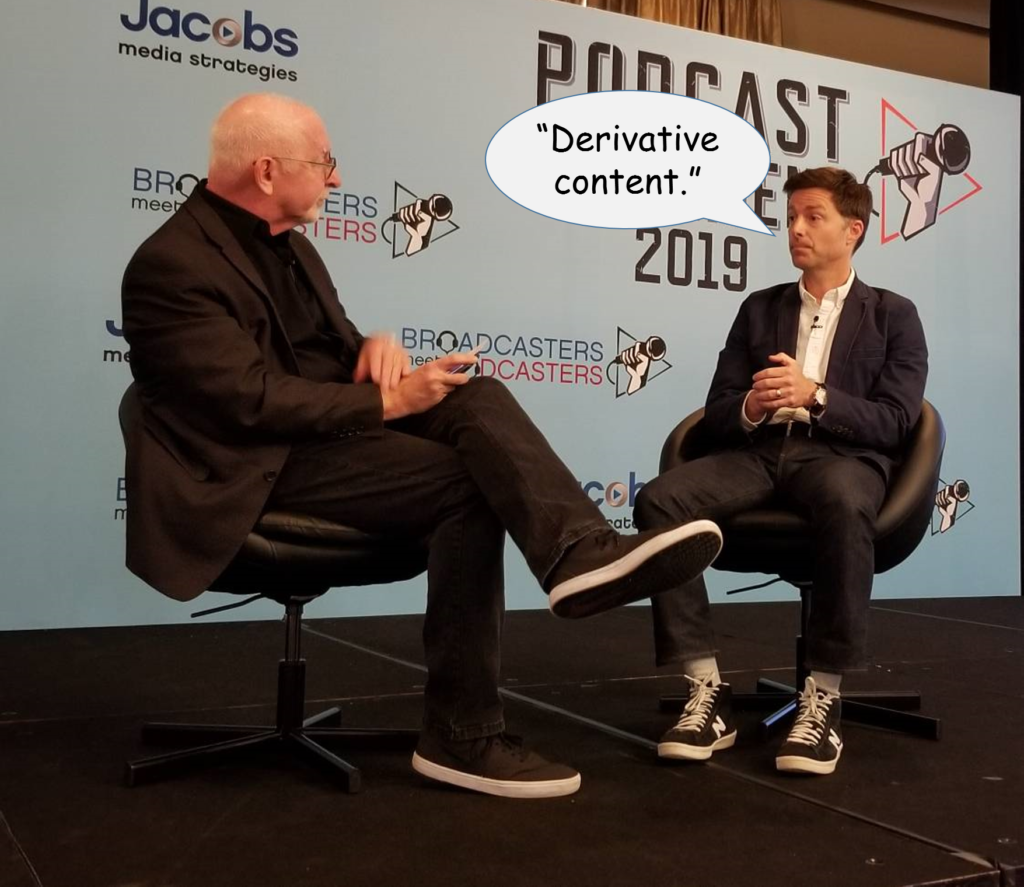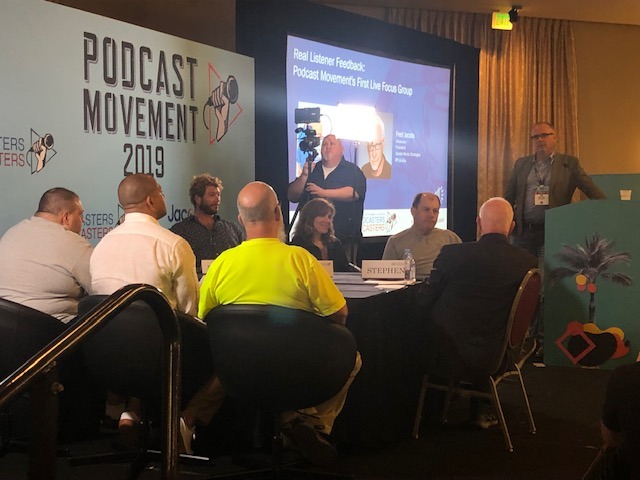
Hubbard Radio’s Greg Strassell turned to me at cocktail party at Podcast Movement, and announced, the words of the day:
Derivative Content
I hadn’t heard the phrase either – that is, until Wednesday morning when I was honored to take the stage at Podcast Movement with the head of the iHeart Podcast Network, Conal Byrne.
You might think about it as “non-traditional revenue,” but that old radio phrase doesn’t really get to the core of what Conal was talking about. Thinking about the podcast franchises in his stable, there are profitable, brand building extensions to be had for podcasters and executives smart enough to seize the opportunity.
TV, books, film, merchandise, live theater appearances – all these can be deployed by savvy podcasters and the companies that own their work. In many ways, it’s the rock band model. While music sales and label deals may not be as prolific or as profitable as they once were, musicians and their bands have discovered their own “derivative content.”
Those long lines at merch booths, special “gold” memberships in loyalty clubs, and inside access opportunities are all part of how they are developing their brands and building their followings.
Of course, the marketing and sales of “derivative content” in podcasting is leveraged on its personalities. Just like it is for great radio shows.
Is it “This American Life’s” subject matter – or is it Ira Glass? Is it all those seedy rock n’ roll stories on “Disgraceland” or is it Jake Brennan‘s clever way of spinning those tales? Is it Mark Ramsey digging into scary classic films like “Jaws” and “Psycho,” or is it his macabre writing and delivery style?
In radio and in podcasting, it is personalities that drive loyalty, and motivate consumers to dig deeper into their wallets to experience their magic. Ergo: derivative content.
I saw this live and in color today on our Broadcasters Meet Podcasters stage at Podcast Movement. We ran a bold experiment – a live focus group for a podcast with real respondents in front of the assembled masses in the Conway Ballroom. We were fortunate to work with Joe Saul-Sehy, host of the “Stacking Benjamins” podcast – a lighthearted, humorous financial series that’s been around since 2012.

To hear fans of this podcast talk about Joe isn’t dissimilar to the way MMR P1s sing the praises of midday icon Pierrre Robert. These acolytes know Joe – his quirks, his catch-phrases, his mom, his “basement,” and his co-host. They wouldn’t think of missing a show. (BTW, Pierre will be inducted into the Philadelphia Music Alliance’s Walk of Fame.)
While they enjoy his guests, the real appeal of “Stacking Benjamins” is Joe’s folksy humor and his banter with sidekick “OG” – or the “other guy” on the mic. That’s what drives listenership and habit-forming loyalty.
When I finished moderating the discussion about “Stacking Benjamins,” and then surprised the respondents – Joe was in the room, and came on stage to greet them, and ask them a question or two. But the look on their faces when they saw one of their podcast heroes was worth the price of admission. And it was another reminder about the power of personality.
That’s precisely why all the members of our small research project say they’d pay money to Joe and his team perform a live podcast at a Central Florida venue. And why several of them had already purchased “Stacking Benjamins” merch.

Conal Byrne’s “derivative content” business model works when consumers believe in personalities and great brands. That’s what Major League Baseball was thinking with their latest plan to play a game between the Yankees and White Sox at the famous “Field of Dreams” baseball field near Dyserville, Iowa.
You may remember the 1989 Kevin Coster film of the same name that was an ode to the joy of baseball, family, and simpler times in America.
For MLB, this game illustrated their “derivative content” strategy by bringing baseball back to its roots. As the game has become highly commercialized, televized, and commoditized, the experience of going to see two teams play baseball has been diminished.
As writer Jon Last notes in MediaPost, MLB research has shows that providing intimate access to fans is an “authentic extension” of a brand that still has a strong fan base. Like a small theater setting for a podcast, there’s a finite limit of seats available for a professional baseball game situated at the iconic “Field of Dreams.”
“Authenticity ” is another favorite Conal Byrne term. Although the word is bandied about way too frequently at media conferences like Podcast Movement, it is on-point when it comes to creating successful franchises that lead to “derivative content” – and of course, additional revenue.
Jon Last also points to other examples of MLB’s NTR – fan fests, bus caravans – bringing the big game of baseball to regional and local fans all over the U.S. As we learned in our focus group for “Stacking Benjamins,” that exposure, brand building, and yes, pure profits are available to Joe Saul-Sehy – and other podcasters and broadcasters.
Last writes about how this baseball game played in the middle of an Iowa field was “special and personality relevant. The ‘Field of Dreams Game’s’ combination of exclusivity and intimacy follows that road map.”
You never know – Conal Byrne’s next job could be commissioner of Major League Baseball. As our “Broadcasters Meet Podcasters” attendees learned this week, he is well on his way to becoming the commissioner of Podcasts.
Special thanks to Keith Dakin!
- Media And Technology In 2025: Believe It Or Not! - April 18, 2025
- In Radio, You Just Never Know - April 17, 2025
- The Secret To Making A Great Podcast (And Great Radio) - April 16, 2025




I am not seeing how this is anything new that hasn’t been talked about before in the podcasting space, and has been implemented. Other than iHeart has put a term to it to make it all new and their idea. I have these conversations with my podcast clients every day.
Brett, sorry if I made it sound totally original. But Conal has put a name on something that should be a part of every podcaster’s lexicon. As many struggle to monetize their podcasts, this derivative content is something many just don’t think about – at least to the degree they should. After spending three intense days at Podcast Movement, I can tell you that many podcasters in attendance (including broadcasters) have not elevated these outside ventures to the level they should occupy. Thanks for the comments.
At first glance…
An odd name…
“Derivative” before the noun “content” displays like an adjective.
In that context, it is almost always perceived/read as a negative thing.
It caught me off guard, too. But content that comes from something else – in this case, the core product, is the way I think about it.